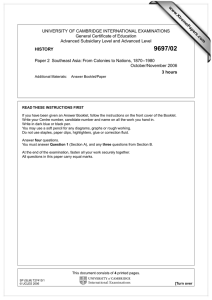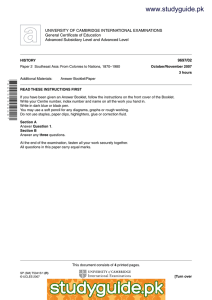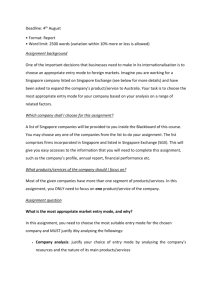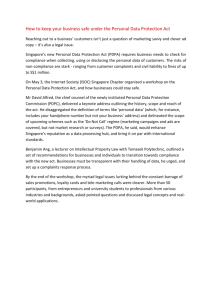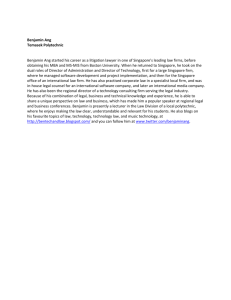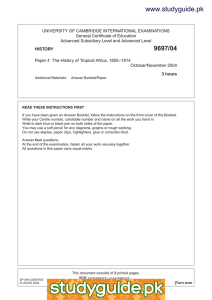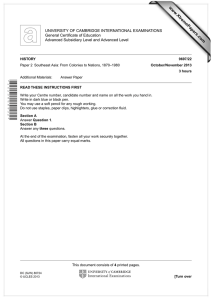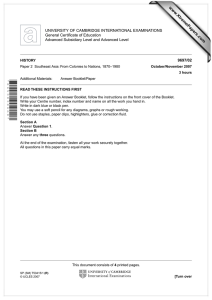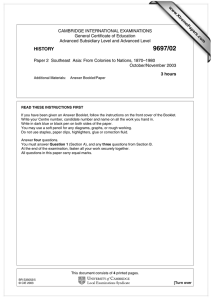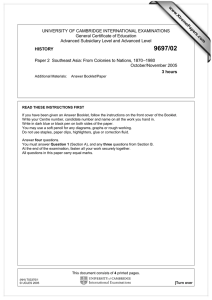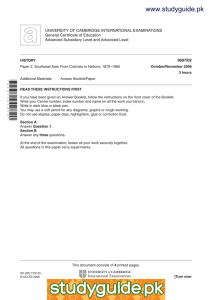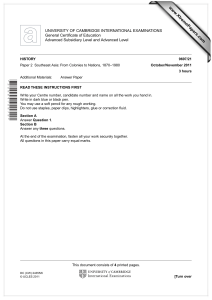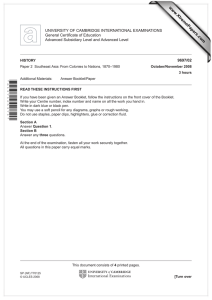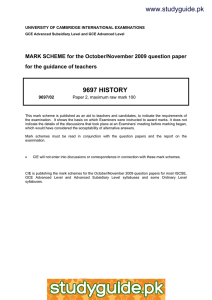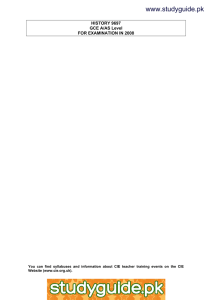www.studyguide.pk
advertisement
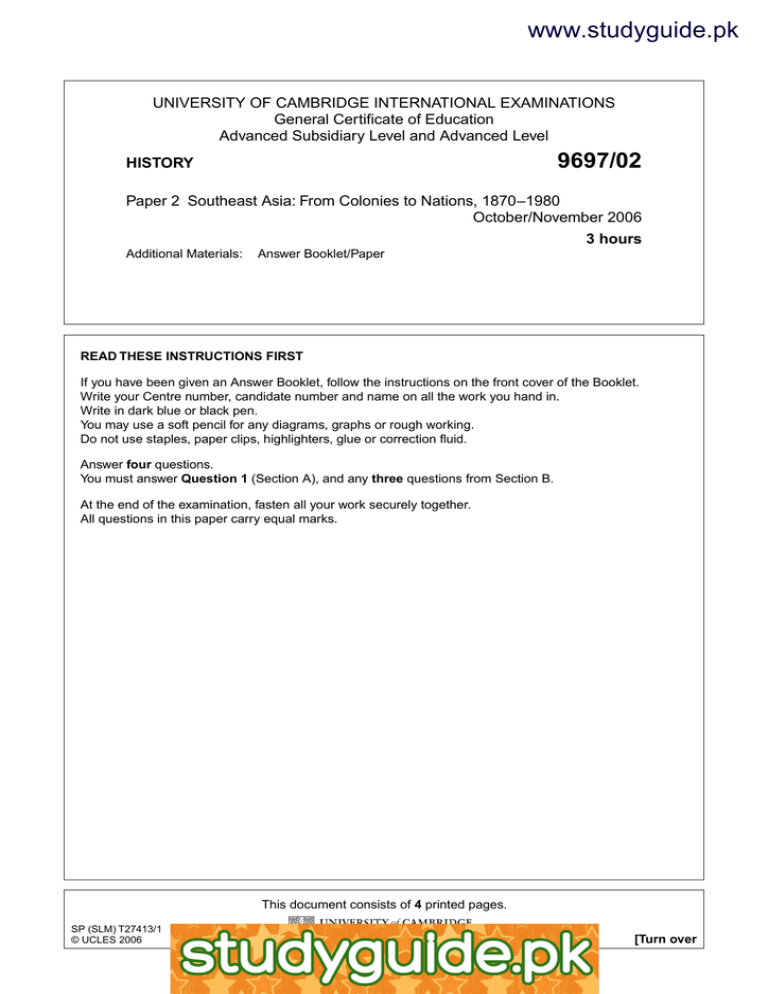
www.studyguide.pk UNIVERSITY OF CAMBRIDGE INTERNATIONAL EXAMINATIONS General Certificate of Education Advanced Subsidiary Level and Advanced Level 9697/02 HISTORY Paper 2 Southeast Asia: From Colonies to Nations, 1870–1980 October/November 2006 3 hours Additional Materials: Answer Booklet/Paper READ THESE INSTRUCTIONS FIRST If you have been given an Answer Booklet, follow the instructions on the front cover of the Booklet. Write your Centre number, candidate number and name on all the work you hand in. Write in dark blue or black pen. You may use a soft pencil for any diagrams, graphs or rough working. Do not use staples, paper clips, highlighters, glue or correction fluid. Answer four questions. You must answer Question 1 (Section A), and any three questions from Section B. At the end of the examination, fasten all your work securely together. All questions in this paper carry equal marks. This document consists of 4 printed pages. SP (SLM) T27413/1 © UCLES 2006 [Turn over www.xtremepapers.net www.studyguide.pk 2 SECTION A: The Political Development of Singapore, 1945-65 You must answer Question 1. SINGAPORE AS A CROWN COLONY 1 Read the sources, and then answer the question. When answering Question 1, candidates are advised to pay particular attention to the interpretation and evaluation of the Sources both individually and as a group. Source A British ‘Imperialism’ is dead, except as a slogan used by our critics. One illustration of this is our policy in India. The British approach to the complex problems presented by the administration of backward tropical colonial territories is both liberal and dynamic. The effective British administration in most territories makes more impressive the success with which the first problems of establishing law and order and opening up communications have been tackled. On the sound foundations now established, Britain pushes forward with schemes for the enlightenment and welfare of the colonial peoples and for giving them an ever-increasing measure of self-government. Statement by the British Deputy Prime Minister, Herbert Morrison (Labour Party), to the Parliamentary Committee on Overseas Information Services, 17 August 1946. Source B The combination of determined leadership, successful strikes and intimidation gave the communists a stranglehold over labour which was difficult to break. But by the latter months of 1947 the Singapore Federation of Trade Unions began to weaken due to government action. From March 1947 the colonial authorities began to register unions under the 1940 Trade Union Ordinance, which gave the government closer supervision over finance and membership and forbade the use of funds for political purposes. The political institutions of the first post-war decade were remote from the real issues and developments of the day. The British saw the path to self-government starting with a municipal council and a legislative council, which would gradually become more elective and Asiandominated, steadily taking over more responsibility for Singapore’s affairs. But far from being a liberal training ground for democracy and a stepping-stone to independence, legislative councils could be a barrier to progress. In Singapore the provisions for voting rights and insistence on English as the sole official language meant that the legislative and municipal councils were the preserve of Europeans and of English-educated, western-oriented, well-to-do, professional and commercial men, whose interests and thinking were in line with the British community. From a History of Singapore published in 1977. © UCLES 2006 9697/02/O/N/06 www.xtremepapers.net www.studyguide.pk 3 Source C For Singapore, 1948 was an eventful year. Many of our neighbours experienced difficult times and the year’s end brought news of further Communist advances in China, the flaring-up of war in Indonesia, the continued weakness of the central authority in Burma, the absence of any final settlement of the problems in French Indochina, and, nearer home, the still not finally suppressed banditry in the Federation. Yet in Singapore itself, the strategic centre of Southeast Asia, law and order were maintained and trade, the life blood of the Colony, remained at a high level throughout the year. Singapore Annual Report (1948) edited by the Singapore Colonial Secretary. Source D I believe self-government is better for a people than colonial government, however enlightened. Colonialism is by definition the domination and exploitation of one country by and for another. I believe the colonial power’s basic interest in this territory is twofold – as the military stronghold for the whole of the Western Pacific sea-board from Japan to New Zealand and westward to Pakistan, and economically as the goldmine that supports its economy. I believe that if we concede these two basic interests and agree not to undermine them for the next fifteen years, the colonial power will immediately grant full internal self-government (as distinct from independence) including control of the export of wealth from this territory. I believe the Rendel Constitution of next year is out of date today. The retention by the British of control over finance, administration, and internal security and law means the retention of the central positions controlling the direction and pace of our development. The British fear dispute and dissent if strong local politicians were to be elected. It is colonialism unchanged in character with local men receiving the blame, for unpopular measures. From an article written by David Marshall and published in a newspaper in October 1954. Source E Nobody has ever denied that communists then stood shoulder to shoulder with the nationalists within the PAP. Lee Kuan Yew was aware of this. But, from the start, he made his position clear. He was willing to form a united front with anyone prepared to fight with him, constitutionally, to rid Singapore and Malaya of British control. Lee will not listen to British protests that Britain never intended to challenge independence, and wished only to bring it about realistically and practically. Not believing this, Lee and his party adopted a fighting posture, and he still feels that the British would never have handed over complete government of the island to the local people had they not, in effect, forced the British to do so. From a biography of Lee Kuan Yew written with his collaboration, published in 1968. Now answer the following question. ‘Against a background of war and revolutionary change across Asia in the ten years following the end of the Second World War, the British neither sought nor encouraged political change in Singapore.’ How far do Sources A–E support this statement? © UCLES 2006 9697/02/O/N/06 www.xtremepapers.net [Turn over www.studyguide.pk 4 SECTION B You must answer three questions from this section. You must support each answer with examples drawn from at least three countries. 2 ‘Colonial disruption of traditional authority caused a power vacuum which created new forms of indigenous political leadership.’ Discuss with reference to the period 1870 to 1940. 3 Assess the impact of European colonialism on the development of urban centres of administration and commerce from 1870 to 1914. 4 To what extent did the Great Depression of the 1930s affect the economic situation of the peoples of Southeast Asia? 5 How far was the success of the nationalist movements in Southeast Asia dependent upon the personalities of their leaders? 6 Was the defeat of Japan by the Allies more of a help than a hindrance to nationalist movements in Southeast Asia? (You must not use examples drawn from Singapore to support your answer.) 7 How far were the ethnic minorities a cause of political instability in the newly-independent Southeast Asian states? 8 How effective were ASEAN’s attempts at regional co-operation in Southeast Asia up to 1980? Copyright Acknowledgements: Source B Source E © C. Mary Turnbull; History of Singapore, 1819–1975; 1978. Alex Josey; Lee Kuan Yew ; Donald Moore Press; 1968. Copyright © Alex Josey. Permission to reproduce items where third-party owned material protected by copyright is included has been sought and cleared where possible. Every reasonable effort has been made by the publisher (UCLES) to trace copyright holders, but if any items requiring clearance have unwittingly been included, the publisher will be pleased to make amends at the earliest possible opportunity. University of Cambridge International Examinations is part of the University of Cambridge Local Examinations Syndicate (UCLES), which is itself a department of the University of Cambridge. © UCLES 2006 9697/02/O/N/06 www.xtremepapers.net
